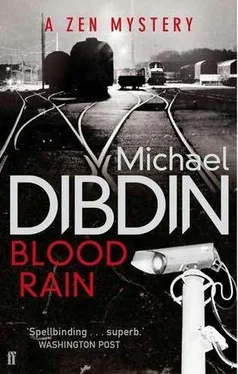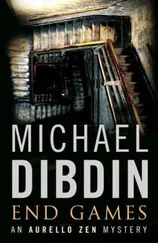Michael Dibdin - Blood rain
Здесь есть возможность читать онлайн «Michael Dibdin - Blood rain» весь текст электронной книги совершенно бесплатно (целиком полную версию без сокращений). В некоторых случаях можно слушать аудио, скачать через торрент в формате fb2 и присутствует краткое содержание. Жанр: Полицейский детектив, на английском языке. Описание произведения, (предисловие) а так же отзывы посетителей доступны на портале библиотеки ЛибКат.
- Название:Blood rain
- Автор:
- Жанр:
- Год:неизвестен
- ISBN:нет данных
- Рейтинг книги:3 / 5. Голосов: 1
-
Избранное:Добавить в избранное
- Отзывы:
-
Ваша оценка:
- 60
- 1
- 2
- 3
- 4
- 5
Blood rain: краткое содержание, описание и аннотация
Предлагаем к чтению аннотацию, описание, краткое содержание или предисловие (зависит от того, что написал сам автор книги «Blood rain»). Если вы не нашли необходимую информацию о книге — напишите в комментариях, мы постараемся отыскать её.
Blood rain — читать онлайн бесплатно полную книгу (весь текст) целиком
Ниже представлен текст книги, разбитый по страницам. Система сохранения места последней прочитанной страницы, позволяет с удобством читать онлайн бесплатно книгу «Blood rain», без необходимости каждый раз заново искать на чём Вы остановились. Поставьте закладку, и сможете в любой момент перейти на страницу, на которой закончили чтение.
Интервал:
Закладка:
At five to eight the sirens were already audible in the distance, throated along on the morning breeze off the Ionian Sea, growing in strength all the time, nearing, homing in on their target. Precisely as the hour struck from a nearby church, they peaked and then wound down in front of the apartment building where she lived. ‘One, two, three, four, five…’ she counted under her breath. When she reached ten, the phone rang.
Tu proverai si come sa di sale lo pane altrui,’ a voice announced.
‘E com’e duro calle lo scendere e’l salir per l’altrui scale,’ Corinna Nunziatella replied, and hung up.
As always, she asked herself which ironic genius had selected Dante’s famous lines on the bitterness of exile as that week’s coded phrase announcing her bodyguards’ arrival: ‘You’ll find out just how salty other people’s bread tastes, and how hard a road it is to climb up and down other people’s stairs.’
Prior to her present appointment, Corinna had spent a year working in Florence and realized that the poet had meant this quite literally: Tuscan bread was made without salt and was, to her taste, insipid. Poor Dante, on the other hand, in exile north of the Apennines, had evidently been appalled by the daily discovery that the most basic human foodstuff was different there. Although without a trace of self-pity, Corinna could not help reflecting on the still greater bitterness of her own situation: a Sicilian born and bred, yet now an exile in her native land, unable to go up and down her own stairs without an armed guard.
A knock at the door announced the latter’s arrival. Corinna checked by looking through the spyglass inset in the armoured panel, then opened the door with a sigh. Her personal escort that morning was Beppe, a gangling, semi-handsome son of a bitch who, as always, tried to get familiar as they walked downstairs together, she in her dark tailored suit and sensible shoes, he in camouflaged battledress accessorized with a machine-gun suspended on a leather belt strung over his shoulder.
‘Beautiful day!’ was his opening line.
‘Yes.’
‘But not as beautiful as you, Signorina Nunziatella.’
‘That’ll do, Beppe.’
‘I’m sorry, dottoressa, but what do you expect? Here I am five hundred kilometres from home, stuck in a squalid barracks with a bunch of other jerks doing their military service, and risking my life every day to protect the most beautiful woman I’ve ever seen! Have you ever heard of what they call “the Stockholm syndrome”, where the victims fall for their kidnappers? This is a similar thing. Because if you think about it, I’ve been kidnapped by the system, which you represent, dottoressa, so it’s not surprising that I’ve fallen for you like a ton of…’
But by now they had reached the front door, and Beppe had to attend to his duties. He activated the radio strapped into a pouch on his belt and exchanged cryptic and static-garbled phrases with his companions. Then he counted slowly to five, swung open the door and ushered Corinna urgently outside. The two other guards had taken up point positions to either side of the three Fiat saloons which had drawn up in front of the building — where no other vehicle was allowed to park, even momentarily — and were anxiously scanning the street in every direction, their automatic weapons at the ready. Corinna ran the short distance to the second of the cars, whose rear door stood open, ready to receive her. Beppe, who had followed her, slammed the door shut and slapped the roof with his palm. Instantly the convoy containing Judge Nunziatella and her heavily armed escort moved off at speed, sirens screaming and blue lights flashing to alert the citizenry to the fact that yet another government functionary under sentence of death was passing by, panoplied in all the impotent might of the Italian state.
The Palace of Justice in Piazza Verga was an impressive work dating from the Fascist era, occupying an entire city block. Just outside the main entrance stood an enormous statue of a crowned female representing the justice supposedly dispensed within. One of her outstretched palms supported a jubilant male nude, while on the other a similar figure hid his head in shame or fear. Both these figures were more or less life-size, while Justice herself was at least ten metres tall, her vaguely Roman vestments overflowing on to the stone plinth below.
Classical allusions continued in the form of twenty-four rectangular pillars supporting a decorative portico, which in the present political climate gave the impression that the building itself had been imprisoned, and was gazing out at the city through the bars of its cage. But the most disturbing effect was that, apart from an hour or so around midday, the pillars to either side of the statue cast strong vertical shadows across it, turning the image of Justice into an obscure, faceless icon of some pagan deity, utterly indifferent to the joy or the misery of the paltry human figures it held in the palms of its hands.
The perimeter was impressively guarded, with canvas-covered trucks full of soldiers in battledress and an armoured car sporting a 4.5 cm cannon mounted in a swivelling turret. The army had been deployed on the streets of Catania and other Sicilian cities when it became apparent that the burden of protecting prefects, judges, magistrates and other functionaries was putting such a strain on the police forces that there weren’t enough officers left to carry out the investigations and arrests ordered by those members of the judiciary who had survived the assassinations planned by Toto Riina and carried out by his Corleone clan.
Now, though, the political pendulum seemed to be on the point of swinging back again. Voices had been heard in parliament claiming that such a massive show of force was undermining the democratic culture of Italy and shaming the country in the eyes of its partners in the European Union. One deputy had gone so far as to compare it to the brutal repression instituted by Cesare Mori, Mussolini’s Iron Prefect’, who virtually eradicated the Mafia in the 1920s, only for the invading Allies to release the jailed capi and their followers just in time for them to get rich on the easy money and unregulated growth of post-war Italy. No one in the government had expressed such views as yet, but Corinna Nunziatella was by no means alone in feeling that it was only a matter of time before Beppe and his fellow recruits were reunited with their girlfriends and families, and the situation in Sicily returned to what had always passed for ‘normal’.
The convoy of cars drove round to the rear of the Palace of Justice, past the armed guards in their bullet-proof vests, and down a ramp leading into the bowels of the building. Corinna thanked the members of her escort — whose lives, of course, were as much at risk as hers — and took the lift to the third floor, where the offices of the Procura della Repubblica were located, and then walked along a corridor ending at yet another checkpoint. Here she not only had to present her identification to the guard on duty — despite the fact that they both knew each other by sight — but also to pronounce the codeword, changed daily, which permitted access to the offices of the so-called ‘pool’ of AntiMafia magistrates. The security precautions protecting this high-risk group were undeniably impressive, but Corinna knew better than to assume that they would be effective in the event that an order was given to eliminate her. The Mafia was traditionally compared to an octopus concealed in a rocky crevice, its tentacles reaching everywhere. Corinna thought that a pack of invasive rats provided a more accurate analogy: if you blocked up one entrance, they would find or make another.
Despite the elite status of the AntiMafia pool, or perhaps because of the widespread resentment which this exclusive club attracted from colleagues in other branches of the police and judiciary who had not been invited to join, Corinna Nunziatella had as yet been unable to obtain an office more suited to her requirements than the dingy, dark cubicle at the northeast corner of the building which she had originally been assigned. The pointless and oppressive height of its ceiling merely served to emphasize the meagre proportions of the floor space dictated by the newly installed wall panels: 3.5 square metres, to be exact.
Читать дальшеИнтервал:
Закладка:
Похожие книги на «Blood rain»
Представляем Вашему вниманию похожие книги на «Blood rain» списком для выбора. Мы отобрали схожую по названию и смыслу литературу в надежде предоставить читателям больше вариантов отыскать новые, интересные, ещё непрочитанные произведения.
Обсуждение, отзывы о книге «Blood rain» и просто собственные мнения читателей. Оставьте ваши комментарии, напишите, что Вы думаете о произведении, его смысле или главных героях. Укажите что конкретно понравилось, а что нет, и почему Вы так считаете.











